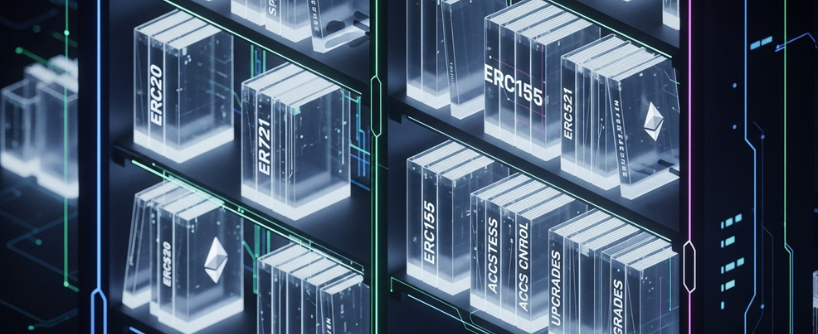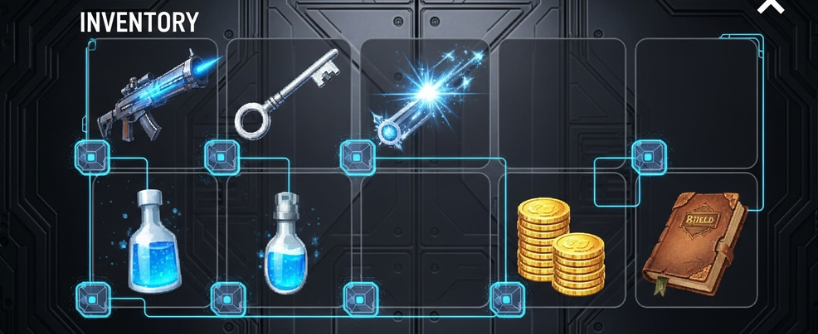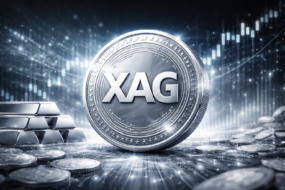
Smart contracts are one of Ethereum’s most important innovations. They are computer programs that run on blockchain technology, enabling automation and trustless transactions. They allow developers to create decentralized systems that operate automatically without intermediaries. By encoding logic into blockchain-based agreements, Ethereum smart contracts have enabled decentralized finance (DeFi), non-fungible tokens (NFTs), supply chain solutions, and gaming platforms. While smart contracts automate agreements, it’s important to note that they are not always legal agreements in the traditional sense. A useful metaphor is the vending machine: just as a vending machine automatically dispenses a snack when the correct input is provided, a smart contract automatically enforces rules based on predefined inputs.
For token projects, the foundation of success lies in selecting the right approach to smart contract development. The main point to consider is whether to use OpenZeppelin smart contracts or build custom smart contracts. OpenZeppelin offers audited, standardized templates that make development faster and more secure. Custom contracts, on the other hand, provide complete flexibility but come with increased risks and costs.
This decision shapes the future of a project. It impacts not only security but also speed to market, scalability, and adoption by the Ethereum ecosystem, as well as the broader world of smart contracts and blockchain technology. In this article, we will explore both options in depth, compare their advantages and drawbacks, and provide guidance on how to choose the right approach for your token project.
What Are Smart Contracts?

Smart contracts are computer programs that execute on the blockchain as self-executing agreements. These programs are executed automatically when predefined conditions are met, ensuring that the contractual rules are enforced without manual intervention. For example, a smart contract for a token might release funds when a certain milestone is reached, or it might allow transfers only under specific conditions. Smart contracts can also interact with other smart contracts to enable more complex functionality and interoperability on the blockchain.
Core Features of Smart Contracts
- Automation: Executes rules and automates transactions between multiple parties, including anonymous parties, without the need for a central authority or third-party involvement.
- Transparency: Anyone can review the code and transactions on the blockchain, which benefits all parties by ensuring trust and accountability.
- Immutability: Once deployed, smart contracts cannot be easily changed, making them resistant to tampering, a benefit for all parties involved.
- Security: Transactions are validated and recorded on Ethereum, reducing fraud risks.
Why They Matter for Token Projects
Ethereum token smart contracts define supply, transfers, permissions, and other mechanics. They ensure tokens are interoperable with wallets, exchanges, and decentralized applications by allowing them to integrate seamlessly with these services and other blockchain platforms. While smart contracts automate on-chain processes, they often require oracles to connect with real world events and data. Choosing the right development method determines whether these contracts are secure, efficient, and future-proof.
OpenZeppelin Smart Contracts

Overview
OpenZeppelin is the most trusted library of Ethereum smart contracts. It provides open-source, audited, and standardized templates for token development. These templates cover major Ethereum token standards such as ERC20, ERC721, and ERC1155. They also include modules for access control, governance, staking, and upgrades. OpenZeppelin is widely used for secure smart contract development, ensuring that developers follow security best practices and use reliable code foundations.
By using OpenZeppelin, developers rely on industry-tested code that has been battle-hardened through years of usage in high-value projects. OpenZeppelin contracts are compatible with various development environments, including test environment, staging environment, and production environment, and integrate seamlessly with ethereum software tools like Hardhat for building, deploying, and testing smart contracts and dApps.
Key Features
- Audited Code: OpenZeppelin smart contracts undergo regular security audits.
- Token Standards: Full support for ERC20, ERC721, and ERC1155 implementations.
- Upgradeable Contracts: Proxy-based upgrade system to evolve functionality over time.
- Role-Based Access Control: Pre-built permissions for administrators and users.
- Semantic Versioning: OpenZeppelin uses semantic versioning to manage contract updates and ensure compatibility during development and deployment workflows.
- Open Source: Free to use and continuously maintained by the community.
Example: ERC20 Token with OpenZeppelin
import "@openzeppelin/contracts/token/ERC20/ERC20.sol";
contract MyToken is ERC20 {
constructor(uint256 initialSupply) ERC20("MyToken", "MTK") {
_mint(msg.sender, initialSupply);
}
}With just a few lines of code, developers can deploy a fully functional ERC20 token. This simplicity is one of OpenZeppelin’s strengths.
When deploying this contract to a blockchain network such as the Ethereum network or a testnet like Sepolia, the deployment process involves sending a special transaction that includes the compiled contract code. Once the transaction is confirmed on the network, a unique contract address is assigned to the deployed contract. You can find this contract address on block explorers like Etherscan by searching for the transaction or address used during deployment. After deployment, users can interact with the contract by writing transactions to its contract address on the network, allowing them to call functions and modify the contract’s state.
Advantages of OpenZeppelin
- Security: Trusted, audited code reduces vulnerability risks.
- Speed: Faster development using templates, with the added benefit of rapid, secure deployment for your project.
- Compatibility: Ensures tokens work with wallets, dApps, and exchanges.
- Community Support: Extensive documentation and developer forums.
Limitations of OpenZeppelin
- Customization Limits: Templates may not support highly unique use cases.
- Dependency: Developers must rely on OpenZeppelin updates.
- Learning Curve for Customization: Extending templates requires a good understanding of Solidity.
Custom Smart Contracts

Overview
Custom smart contracts are written from scratch by developers who want complete control over functionality, involving creating new code and managing all aspects of the contract’s features. Unlike OpenZeppelin’s standardized templates, custom contracts allow teams to design unique tokenomics, governance models, or application-specific logic.
Key Features
- Full Flexibility: Developers define every function.
- Unique Logic: Ability to innovate beyond standard templates.
- Ownership: The project team acts as the owner, controlling privileged actions within the contract and managing access to sensitive functions.
Advantages of Custom Smart Contracts
- Unlimited Customization: No restrictions from frameworks.
- Innovation: Developers can create novel token features or hybrid models.
- Differentiation: Projects stand out by offering unique mechanisms.
Limitations of Custom Smart Contracts
- Security Risks: Higher potential for coding errors and exploits. For multisignature (multisig) contracts, proper key management is crucial to prevent loss of funds and to ensure that only authorized parties can execute transactions securely.
- Longer Development Time: Building from scratch takes more resources.
- Higher Costs: Security audits for custom contracts are expensive.
- Integration Challenges: Ensuring compatibility with wallets and exchanges may require extra effort.
Comparing OpenZeppelin and Custom Smart Contracts
| Feature | OpenZeppelin Smart Contracts | Custom Smart Contracts |
| Security | Audited, widely tested | Depends on team expertise and audits |
| Development Speed | Fast, templates reduce workload | Slower, requires full coding |
| Customization | Limited but extendable | Unlimited flexibility |
| Cost | Low development, moderate audit cost | Higher development and audit cost |
| Gas Costs | Typically lower gas costs for deployment and transactions due to optimized code | Gas costs can be higher for deployment and transactions, especially with complex or unoptimized code |
| Ecosystem Compatibility | High, follows Ethereum token standards | Varies, may need extra coding |
| Best Use Cases | Standard tokens, fast launches | Complex, innovative tokenomics |
Security Considerations

Security is the most critical factor in token smart contract development. Mistakes can lead to catastrophic losses. Secure contract execution is essential, as it ensures that agreements are enforced in a verifiable manner and are controlled by the blockchain network itself, rather than by any single user or authority.
- OpenZeppelin: Code is audited and battle-tested. Risks are significantly reduced, making it ideal for projects with limited security expertise.
- Custom Contracts: Require professional audits, penetration testing, and bug bounties. Without these, they pose a high risk.
Best practices include limiting admin powers, using multi-signature wallets for upgrades, avoiding infinite ERC20 approvals, and performing ongoing monitoring after deployment.
Case Studies
OpenZeppelin in DeFi

Many leading DeFi protocols, such as Uniswap and Compound, rely on OpenZeppelin contracts. They trust the library for its reliability and interoperability.
Custom Contracts in Gaming

Some blockchain games use custom contracts to design unique economies where players can mint assets, combine items, or upgrade tokens in ways not supported by OpenZeppelin templates. These custom contracts often interact with other contracts to enable complex game mechanics and extend in-game functionality. These projects often spend months on audits to ensure security.
When to Use OpenZeppelin vs Custom Smart Contracts

Use OpenZeppelin if:
- You need standard tokens quickly.
- Security is a priority.
- Your budget is limited.
- You want to facilitate direct transactions between two parties without intermediaries
Use Custom Contracts if:
- You want unique features not supported by templates.
- You have strong development expertise.
- You can afford audits and longer timelines.
- You need to enable direct agreements between two parties, such as buyers and sellers, for peer-to-peer transactions.
Note: Deploying or interacting with smart contracts requires users to pay gas fees in Ether to cover the computational resources on the Ethereum network.
Future of Token Smart Contracts
Ethereum’s shift to Layer 2 scaling solutions and Ethereum 2.0 will make contract deployment cheaper and faster. OpenZeppelin will continue to expand its library, while custom contracts will remain essential for groundbreaking innovation. Token projects will likely use a hybrid approach: starting with OpenZeppelin for reliability and adding custom features as needed. Additionally, new approaches and features are being proposed to further enhance smart contract functionality, reflecting ongoing innovation in the field.
Frequently Asked Questions
What are the main advantages of OpenZeppelin smart contracts?
OpenZeppelin contracts save developers significant time because they come pre-built with commonly used functions, such as token transfers, minting, and burning. This prevents teams from reinventing the wheel for every new project. They also reduce development costs because the contracts are open-source and freely available to the community. Most importantly, OpenZeppelin contracts are pre-audited and widely tested, which makes them more secure compared to untested code. Their strong compatibility with wallets like MetaMask, exchanges such as Uniswap, and decentralized applications (dApps) across Ethereum ensures a smooth user experience. In short, OpenZeppelin is a reliable foundation that allows developers to focus on building unique features rather than worrying about standard implementations.
Are custom smart contracts more risky?
Yes, custom contracts inherently carry more risk because they are written entirely from scratch. Every new function or line of code introduces potential vulnerabilities that hackers could exploit. Without the backing of pre-audited frameworks, developers must rely heavily on their expertise and rigorous testing practices. This makes professional security audits mandatory for custom projects, and often multiple audits are required for confidence. While risk is higher, the payoff can be greater if the project successfully introduces innovative tokenomics or new decentralized functionalities not supported by existing frameworks.
Can OpenZeppelin contracts be customized?
Yes, OpenZeppelin contracts are designed to be modular and customizable. Developers can extend existing templates by writing new functions or overriding inherited ones. This flexibility means that projects can start with secure, audited code but still add features tailored to their needs. For example, a project might add special governance rules to an ERC20 token or extend an ERC721 NFT to include advanced royalty mechanisms. However, customization must be done carefully. Each modification should be tested and ideally audited, because altering proven templates incorrectly can compromise security.
How do security audits differ for OpenZeppelin and custom contracts?
Security audits for OpenZeppelin-based contracts tend to be simpler and less expensive because the underlying code has already been thoroughly vetted. Auditors can focus on checking the modifications a project has made, ensuring they don’t create vulnerabilities. Custom smart contracts, however, are far more complex to audit because every line of code is unique. This means auditors must review the entire contract from the ground up, which takes more time and costs significantly more. For projects with limited budgets, starting with OpenZeppelin templates reduces both the financial burden and audit complexity.
Which approach is faster for launching a token?
OpenZeppelin is much faster for launching tokens because developers can deploy an ERC20 or ERC721 token in just days. With the standard functions already implemented, the team only needs to configure parameters like supply or token name. Custom contracts, however, require writing code from scratch, testing thoroughly, and undergoing multiple audits, which can extend development timelines to weeks or months. For startups racing to capture market opportunities, speed is often a deciding factor. Once deployed, each contract receives a unique address on Ethereum, which users can interact with through wallets or exchanges.
Which option is better for innovation?
Custom contracts are better suited for innovation because they provide developers with unlimited flexibility. If a project’s value proposition relies on unique tokenomics, advanced governance structures, or innovative DeFi mechanisms, custom coding may be necessary. For example, a game that uses hybrid fungible and non-fungible assets might need a novel structure beyond OpenZeppelin’s standard templates. However, innovation comes at a cost. It requires advanced development expertise, additional testing, and thorough audits. Projects must weigh whether their need for innovation justifies the added risks and expenses compared to using pre-built frameworks.
Are OpenZeppelin smart contracts free?
Yes, OpenZeppelin contracts are completely free to use because they are open-source under the MIT license. This makes them attractive to both startups and established blockchain companies looking to reduce costs. However, while the templates themselves are free, projects should not skip audits. Even if developers rely on pre-audited code, modifications may introduce vulnerabilities that need reviewing. Many projects find that using OpenZeppelin still significantly reduces overall development expenses compared to building everything from scratch.
Can I start with OpenZeppelin and later switch to custom contracts?
Yes, many projects follow this hybrid approach. They begin with OpenZeppelin contracts to quickly deploy a secure, standard token that can integrate with wallets and exchanges. This allows them to build community trust and gain adoption early. Later, once they secure funding and expand their team, they may develop custom smart contracts to introduce new features or unique governance systems. This staged strategy provides the best of both worlds: speed and security in the beginning, followed by innovation and differentiation once the project matures.
How do OpenZeppelin contracts support upgrades?
OpenZeppelin provides an upgradeable contracts library that uses a proxy pattern. This separates the contract’s data layer from its logic layer, allowing developers to upgrade the logic without redeploying the entire contract. This is especially important for projects that need to evolve over time, such as DeFi protocols adding new features or fixing vulnerabilities. By supporting upgrades, OpenZeppelin offers long-term sustainability and adaptability, which makes it appealing to developers who do not want their contracts to become obsolete after launch.
Which option is cheaper overall?
OpenZeppelin is almost always the cheaper option because development time is minimized and audits are simpler. Teams can deploy secure tokens quickly without investing months into coding and testing. Custom contracts, by contrast, require larger budgets due to the cost of development, testing, and audits. However, the cheaper option may not always be the best. If a project’s success depends on a novel feature set, investing in custom contracts might be justified despite the higher cost.
How do users interact with OpenZeppelin smart contracts?
Users interact with OpenZeppelin-based contracts the same way they interact with any Ethereum smart contract: through wallets like MetaMask. By connecting their wallet, users can sign transactions and trigger contract functions such as transferring tokens or participating in governance. The blockchain then processes and records these interactions transparently. For users, the experience feels seamless, while behind the scenes, OpenZeppelin ensures that the underlying logic is secure and standardized. Smart contracts can also automate transfers of Ether or tokens, reducing reliance on intermediaries.
Glossary
OpenZeppelin Smart Contracts: A widely used library of Ethereum smart contracts offering audited, pre-built templates for ERC20, ERC721, ERC1155, governance, and upgradeable contracts.
Custom Smart Contracts: Smart contracts developed entirely from scratch. They allow full freedom to create unique logic and tokenomics but require extensive testing and audits to ensure safety.
Smart Contract Templates: Predefined sets of code that developers can use to deploy tokens, manage permissions, or set up governance. They save time by standardizing common functions.
Ethereum Token Smart Contracts: Contracts that define how tokens behave on the Ethereum network, including supply, transfers, and ownership rules. Examples include ERC20 for fungible tokens and ERC721 for NFTs.
Token Smart Contract Security: The process of safeguarding contracts against vulnerabilities through secure coding, audits, and monitoring. A critical component in avoiding hacks and financial losses.
Proxy Upgrades: A design pattern that separates data from logic, allowing developers to upgrade a contract’s code without affecting stored balances or records. Widely used for scalable projects.
Multi-Signature Wallets: Wallets requiring multiple private keys to authorize transactions. Commonly used by teams to secure administrative functions and prevent unilateral access.
Decentralized Applications (dApps): Applications built on Ethereum or other blockchains that run on smart contracts. Examples include Uniswap, Aave, and OpenSea.
Security Audits: Professional evaluations of smart contract code to identify vulnerabilities. Audits are critical for ensuring trust in both OpenZeppelin-based and custom projects.
Tokenomics: The study and design of a token’s economic model, including supply distribution, staking incentives, inflation control, and governance mechanisms.
Program: A set of coded instructions executed by a computer. In blockchain, a smart contract is a program that runs automatically on Ethereum when triggered by transactions.
Gas Fees: The transaction fees paid in Ether to execute operations on Ethereum, including deploying or interacting with smart contracts. Gas fees fluctuate based on network demand.
Governance Module: A component of smart contracts that allows token holders to vote on proposals and changes within a decentralized organization.
Reentrancy Attack: A common vulnerability where malicious actors exploit repeated calls to drain funds from a smart contract before its balance updates. Preventable through secure coding practices.
Conclusion
Choosing between OpenZeppelin and custom smart contracts is one of the most important decisions for any Ethereum token project. OpenZeppelin provides security, speed, and reliability, making it ideal for most standard tokens and applications. Custom smart contracts enable innovation and unique functionality but require more time, higher costs, and extensive audits.
The right choice depends on your project’s priorities. If speed, security, and compatibility are most important, OpenZeppelin is the best fit. If your project requires groundbreaking tokenomics or governance models, custom contracts may be worth the extra effort. Many projects start with OpenZeppelin and gradually transition to custom solutions, combining the strengths of both approaches.
By weighing your budget, timeline, and technical needs, you can make an informed choice that sets your token project on the path to success in the fast-evolving Ethereum ecosystem.
About Bitunix
Bitunix is one of the world’s fastest growing professional derivatives exchanges, trusted by over 3 million users across more than one hundred countries. Ranked among the top exchanges on major data aggregators, Bitunix processes billions in daily volume and offers a comprehensive suite of products including perpetual futures with high leverage, spot markets, and copy trading. Users can trade bitcoin and other major cryptocurrencies on the platform, taking advantage of advanced trading features. Known for its Ultra K line trading experience and responsive support, Bitunix provides a secure, transparent, and rewarding environment for both professional and everyday traders. Bitunix Academy adds structured lessons so you can build skills while you trade.
Bitunix Global Accounts
X | Telegram Announcements | Telegram Global | CoinMarketCap | Instagram | Facebook | LinkedIn | Reddit | Medium
Disclaimer: Trading digital assets involves risk and may result in the loss of capital. Always do your own research. Terms, conditions, and regional restrictions may apply.









